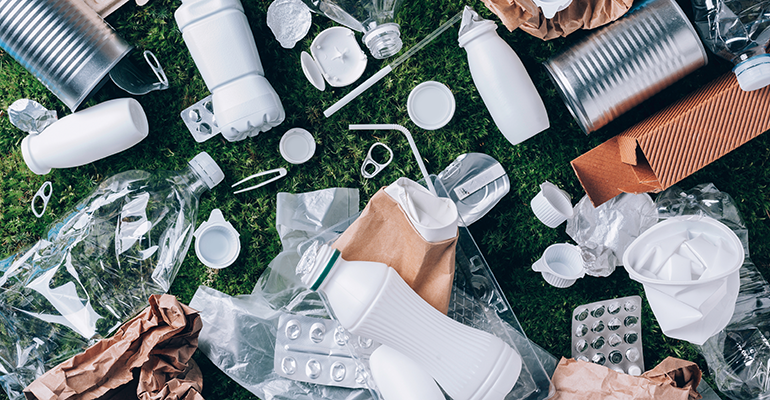Welcome to SJGLE.com! |Register for free|log in
Welcome to SJGLE.com! |Register for free|log in

Related Searches: Tea Vitamin Nutrients Ingredients paper cup packing
As environmental policymakers and packaging distributors prepare to implement Extended Producer Responsibility (EPR) in the UK, food and drink manufacturers get ready to updat their packaging, recycling, and reusing practices.

© AdobeStock/jchizhe
The next few months are “crucial”, Ecoveritas told Ingredients Network. It will see the industry work to get the packaging producers’ community up to speed with the Department for Environment, Food and Rural Affairs (Defra) ’s EPR guidance. The focus is now to get producers fully ready and willing to embrace the first EPR submission, which applies to large organisations, in October 2023.
Required actions under packaging EPR began in January 2023, more than four years after the Government announced it in the Resources and Waste Strategy for England. EPR is a policy approach under which producers have financial and physical responsibility for the treatment or disposal of post-consumer products.
From March 2023, applicable businesses will need to collect data, ready to begin payments in 2024. Obligated producers include those with a turnover of more than £1 million and place more than 25 tonnes of packaging on the market.
The packaging threshold to meet EPR requirements has been reduced to half that of the previous regulation’s stipulations regarding annual turnover and tonnage of packaging handled. As a result, small organisations currently out of the scope of the old packaging regulations system will need to start collecting packaging data from January 2023, ready to register and submit their data in 2024.
Businesses under the threshold will have to comply with mandatory labelling requirements from 2026 to inform consumers about the recyclability of their packaging, Ecoveritas adds.
“We have a significant global issue with packaging waste and pollution,” Andrew McCaffery, Global EPR Director of Ecoveritas, said. In the case of plastic packaging, for example, only 14% is collected for recycling globally, the environmental data specialist says. Simultaneously, a third ends up in the environment and more than half is landfilled or incinerated.
“Despite a backdro of uncertainty, the packaging industry has continued to innovate, create and try things that could impact the future,” says McCaffery. As brands and retailers pursue sustainability targets, the industry has turned to packaging specialists.
“Businesses can now understand how to plan and what regulations will dictate packaging design.” Companies and brands are looking to align with the principles of a circular economy to reduce the negative impact of their packaging and, in turn, respond to consumer, regulatory and internal pressures.
However, balancing commercial decisions related to sustainability with sensitivities such as unit costs, reputational risk, product availability, customer demand and product protection can become complex. “One of the most striking developments is how aggressively companies are moving to translate sustainable packaging goals into robust baselines and specific tactics to realise more sustainable packaging from ideation to commercialisation. We will need policies to fix this broken system.”
 © AdobeStock/yalcinsonat
© AdobeStock/yalcinsonat
EPR is designed to repair the untenable packaging industry today. EPR works to shift the economic burden of plastic’s negative externalities to manufacturers, requiring them to pay or take responsibility for their products and packaging end-of-life.
“While major companies continue to make bold and binding commitments, it is the little bakery on the corner to the small manufacturer that needs support with compliance,” says McCaffery.
A much higher awareness of the problem is coupled with an increasing number of countries putting the waste agenda within a broader context to achieve a circular economy approach. “There is a new breath of momentum at several levels,” says McCaffery.
2023 is expected to be a busy year for environmental policymakers and distributors of packaging. “We will need policies to fix this broken system. New EPR legislation should include provisions that prioritise building out reuse systems and infrastructure,” McCaffery details.
To date, there has been increased recycling wher EPR systems are already in place but no actual reduction in the generation of packaging waste. In the post-EPR implementation era, new developments, and data-driven insights to tackle plastic pollution and waste are urging manufacturers to explore key solutions.
“Most packaging producers impacted by the new packaging regulations are, at best, confused and, at worst, completely oblivious to what’s coming their way.”
While it is up to the sector to communicate, it calls for the necessary tools to help businesses navigate this significant change transition. “The whole process has been plagued by uncertainty, and what we see at ground level is overwhelmed producers realising just how much time and resources will be needed to scale up their data management process to comply with the new regulation requirements.”
Outlining how the new regulation will work in practice for UK businesses that need to comply with this new legal requirement “must become our priority. We must now move beyond discussing its merits and instead help businesses unpick the intricacies in already challenging times.”
E-newsletter
Tags